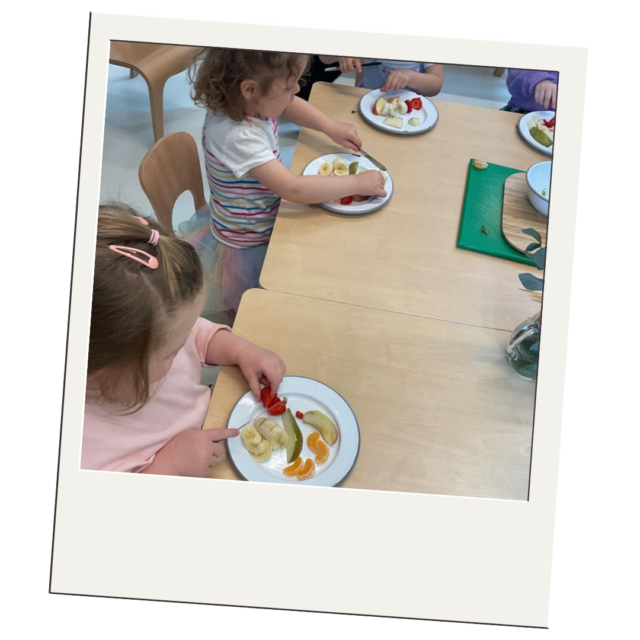Tips for Happy Eaters: How to Encourage Healthy Eating Habits
Feeding young children can sometimes feel like a challenge, especially when dealing with children who are not very receptive to trying new foods. If you’re a parent or educator, you’re likely familiar with the frustration of watching a child refuse to eat a carefully prepared meal. However, it's important to remember that picky eating is a common phase during early childhood, and with the right strategies, you can encourage healthy eating habits that will last a lifetime.
In this blog, we’ll explore some practical tips to help make mealtimes more enjoyable and nutritious to support happy eaters.

1. Create a Positive Mealtime Environment
The atmosphere at mealtime can significantly impact a child's willingness to eat. Make sure that meals are a calm, stress-free time where children feel comfortable trying new foods.
Routine: Establish a regular eating schedule with consistent meal and snack times. Children thrive on routine, and knowing when to expect food can reduce anxiety and reluctance to eat.
Family Meals: Encourage eating together as a family whenever possible. Children are more likely to try new foods when they see their parents and siblings enjoying the same meals.
No Pressure: Avoid pressuring or bribing children to eat. This can create negative associations with food and make them even more resistant to trying new things.
2. Offer a Variety of Foods
Exposure to a wide range of foods is key to expanding a child’s palate. It’s important to offer different textures, colours, and flavours regularly.
Small Portions: Serve small portions of new foods alongside familiar favourites. This reduces the intimidation factor and encourages children to take a bite without feeling overwhelmed. If possible let your child serve themselves. Do not push children to clean or clear their plates of food by eating it all. This can cause anxiety around food further down the line.
Repetition: Don’t be discouraged if a child refuses a new food the first time. It can take multiple exposures—sometimes 8-20—for a child to accept a new taste or texture.
Involvement: Involve children in meal preparation. Let them help with simple tasks like washing vegetables or stirring ingredients. When children are part of the process, they’re more likely to be interested in the final product.

3. Make Food Fun
Turning meals into a fun experience can be a great way to engage happy eaters.
Creative Presentation: Use cookie cutters to create fun shapes out of fruits, vegetables, and sandwiches. Arrange food on the plate in a visually appealing way, like making a smiley face with different ingredients.
Interactive Meals: Create build-your-own meals, like a taco or pizza bar, where children can choose their toppings. This gives them a sense of control and makes eating more interactive.
4. Be Patient and Persistent
Patience is key when dealing with fussy eaters. Changing eating habits doesn’t happen overnight, but persistence pays off.
Stay Calm: If your child refuses a meal, stay calm and avoid showing frustration. Simply offer the food again at another time.
Respect Appetite: Trust your child’s hunger cues. Forcing them to eat when they’re not hungry can lead to negative associations with food. Offer healthy options and allow them to decide how much to eat.
Consistency: Keep offering a variety of foods consistently. Over time, your child will likely become more open to trying new things.
Patience: For some children it takes sometimes up to 8-20 exposures before they are comfortable to eat it.
Slowly build up: start encouraging children to touch the food, then smell it, then lick it. This will start to make them feel comfortable with then chewing and eating it.
If you have concerns: It is very normal whilst a child is learning new foods and flavours to be inconsistent with what they want to eat and when. Their senses are much stronger than adults, a certain smell or texture may be much more intense and off putting for a child than it is for an adult. They will have days where they may really like a food item and hate it the next. If you find that your child does not eat much over 3 days then please speak to a GP, if you find over a period of time that your child is starting to eat less and less types of food and wanting to have the same food daily, please also reach out to your GP.

5. Lead by Example
Children learn by observing the adults around them. Model healthy eating behaviours to encourage your child to follow suit.
Eat Together: Make it a point to eat the same meals as your child, demonstrating enthusiasm for a variety of foods.
Healthy Snacking: Choose healthy snacks for yourself, and offer similar options to your child. If they see you enjoying fruits, vegetables, and other nutritious foods, they’re more likely to want to try them too.
Positive Language: Talk positively about food and mealtimes. Instead of focusing on what they’re not eating, praise them for trying new things, no matter how small the effort.
Conclusion
Working with children that are not so keen to try new food can be challenging, but with the right approach, you can encourage healthy eating habits in a positive and stress-free way. By creating a welcoming mealtime environment, offering a variety of foods, making food fun, leading by example, and being patient, you’ll help your child develop a healthy relationship with food that will benefit them for years to come.
At kinderzimmer, food confidence is extremely important to us. Within all of our nurseries we have multifunctional dining rooms which offer a unique opportunity for children to get comfortable in the kitchen. Not only do we eat together as they would at home, and learn the daily life skills of serving, sharing and clearing away, but also learning farm-to-table practices with produce grown in the garden; how to prepare food safely; baking nutritious snacks for their classmates; and even getting creative with clay or messy with science experiments. Our partnership with Nursery Kitchen enables us to provide exciting, delicious dishes every mealtime and ensures each bite is full of nutritious, fresh ingredients.
Nursery Kitchen’s Food Innovation Team are led by their passion for developing the best possible nursery menus to get children excited about food as early as possible – creating healthy habits for life. Each meal is carefully developed over 9-12 months to ensure it utilises the best, freshest ingredients, reduces the impact on the environment, minimises food waste and is as tasty as it is nutritious.














